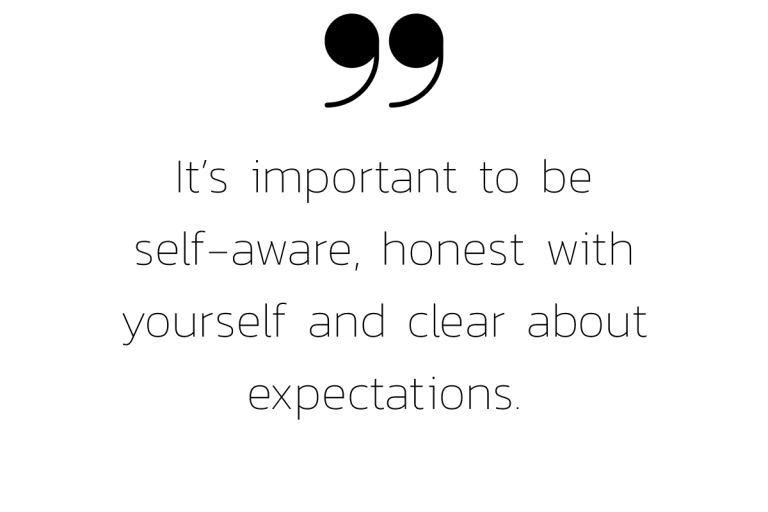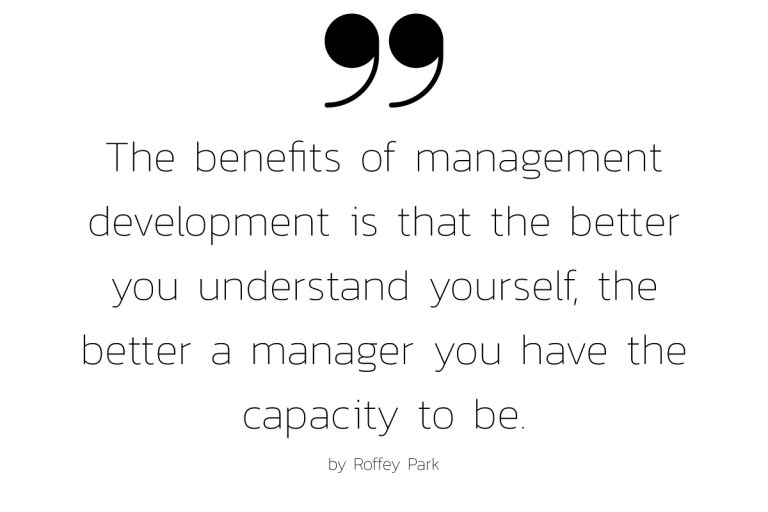What is the difference between leadership and management?
Stephen Covey says: “Management is efficiency in climbing the ladder of success; leadership determines whether the ladder is leaning against the right wall.”

Kathy Austin, a management consultant, is pithier. “Managers light a fire under people; leaders light a fire in people.”
Here’s a third view, that of Warren G. Bennis. “The manager administers; the leader innovates. The manager has a short-range view; the leader has a long-range perspective. The manager asks how and when; the leader asks what and why. The manager has his eye on the bottom line; the leader has his eye on the horizon. The manager accepts the status quo; the leader challenges it.”
Most people know where they draw the line – but is it a fine line or a chasm? And don’t most people in positions of authority both manage and lead?
Clearly, in any responsible role, there is a good chance that you’ll be managing as well as leading.
Here are Roffey Park Leadership and Management Institute, we see management as the decision-making processes you’ll use to manage your resources in the most efficient way to achieve your organisational objectives. This involves planning, prioritising and checking that the right work is being achieved.
In contrast, leadership centres around how you can build a shared vision for the organisation. This has everything to do with the engagement and motivation of others to follow the organisational route, as opposed to their own.
What you do and how you do it will also differ depending on whether you’re a rookie manager, a middle manager or a seasoned CEO.
So having established where the two roles differ, the next important questions are what skills do you need. Later we’ll look at whether management courses or leadership courses can make you better at your job, wherever you sit on the manager/leader continuum.
The top 5 management skills
In reality, you’ll probably find that there is considerable overlap between leadership skills and management skills. If we’re to consider management as the role of ensuring the day-to-day actions, processes and tasks of the organisations are getting done (in the right way, at the right time, and with the right measurable outcomes, then there will be a classic range of skills that all the management books will refer to. Here at Roffey Park, we firmly put people first, and recognise the power of people to help an organisation fulfil its stated purpose and mission. So here, we take some classic management skills and put our Roffey Park people twist on them.
Planning & project management skills
If you’re managing processes and workload, the ability to plan effectively is probably top of the list.
In junior management roles, you’ll most likely have targets to reach which can be measured along the way by key performance indicators. These might typically include predicting the yield or output of your organisation’s processes, the amount of time it takes for each step of a process to be completed, and the amount of resource (that includes, materials, energy, people’s time, total number of people, etc.).
 In more senior management roles, planning will broaden out to setting the targets and objectives in the first place, and taking on a great management responsibility for the outcomes. In most commercially driven settings, management planning will revolve around profitability. Project management is the ongoing management of a task or process to ensure you keep to the different targets that have been set, and that you deliver the work on time, on budget and in the form agreed at the outset.
In more senior management roles, planning will broaden out to setting the targets and objectives in the first place, and taking on a great management responsibility for the outcomes. In most commercially driven settings, management planning will revolve around profitability. Project management is the ongoing management of a task or process to ensure you keep to the different targets that have been set, and that you deliver the work on time, on budget and in the form agreed at the outset.
Planning and project management is notoriously difficult, and quite often (to the utter disbelief of those down below) senior managers and business leaders plan things like sales targets and profit figures with high degrees of guesswork and bravado.
At Roffey Park we believe that one of the most effective approaches to planning, is to work with the people on the front line of whatever it is you’re doing. The more widely you can consult, learn from different people’s experiences of how long a process takes, the best way to carry something out, what works and what doesn’t, the more accurate the picture. Whilst it will usually be impossible to reconcile everyone’s viewpoint, people appreciate being consulted, and as a result feel more engaged and valued.
Decision making skills
In a management role, particularly your first, one of the hardest skills to master can be that of taking decisions. This can be difficult in a management role in particular, because it often here that you find yourself sandwiched between the organisational goals and pressures from above you in the organisational hierarchy, and the issues, constraints (and complaints) coming up to you from staff on the ground. You may also find yourself in a different dynamic, caught between the expectations of external clients whose needs must be balanced with the profitability and resource availability of your organisation.

Managers can be called upon to make decisions on a wide range of issues, often on the spur of the moment. Sometimes, it’s only in retrospect that decisions can be judged as successful or not. Decision making skills are developed over time through experience and training. Training can help by practising certain scenarios in advance,
working through potential outcomes to different decisions, agreeing on approaches with other managers and leaders. In organisations with a strongly human-centred approach like Roffey Park, we would look at how decision making can be delegated down the organisation so that individuals can become more empowered and have more ownership of their own decisions. Where decision-making is delegated, it’s important to also attribute responsibility, and build a network of trust. This often goes hand in hand with the establishment of a learning culture, so that if a decision leads to a bad outcome, everyone ‘fails fast’, learns quickly and moves on.
People skills
However much management might feel like it pertains to the systems and processes of an organisation and the mechanical planning of events and actions, the reality is that almost all organisations that require managers, require people to be managed. Just the very idea of having to “manage people” might fill you with a certain amount of dread, particularly if you’ve just moved up in your organisation and find yourself now in some way “in charge” of people who were your colleagues before your promotion.
Quite often in the past, “people skills” has been seen as the skillset which allows you to “get people to do what you want them to do”. This approach can be short-sighted and manipulative. Far better to bring people along with you. You can achieve this through clear communication, mutual respect, collaboration and teamwork. It can also be about having each other’s backs – i.e. that you support your team’s decisions and defend their actions, even if the approach you all took didn’t go quite to plan. Your personal effectiveness as a leader of others is deeply connected to how you interact with the people around you.
Of all the people skills, we think one in particular needs its own section: listening skills
Listening skills
In a busy, time-poor world, it is very easy to try and rush to get the thing done. A good manager makes time to listen, and listen deeply to staff. This kind of active listening is easier than it sounds. It requires you to stop what you’re doing, disconnect from your screen(s), adopt an open posture, give eye contact, and really listen. With patience and practice, this kind of listening can become second nature and the value of it in managing a team of people, revolutionary.
 If you adopt the approach that you listen to other people how you would wish to be listened to yourself, you quickly realise what is required. Most of us know what we don’t like. When the boss is distracted, pauses you to answer a call, doesn’t look up form the computer or needs to “walk and talk”, and you feel like you’re not really getting through to them. This often leads to half responses, dismissive remarks and less-than-optimal decision making.
If you adopt the approach that you listen to other people how you would wish to be listened to yourself, you quickly realise what is required. Most of us know what we don’t like. When the boss is distracted, pauses you to answer a call, doesn’t look up form the computer or needs to “walk and talk”, and you feel like you’re not really getting through to them. This often leads to half responses, dismissive remarks and less-than-optimal decision making.
The opposite to that is that staff in your care feel valued and consulted. You may not be able to act on or agree with everything that is said, but even so, it’s far better to have heard what people have to say than to have ignored it.
Delegation skills
Having the ability to hand over tasks to others is one of the most important attributes of a good manager. It’s an easy trap to fall into that when you step into a management role, you feel your workload multiplying. The chances are you know how to do a lot of the work that your team are being asked to do. You might even be faster and better and doing it. However, it is utterly impossible to do the work of the entire team, and so delegation becomes important.

In construction, you’ll often hear the phrase that the foreman never picks up the tools. It’s simplistic, but tells us the essentials. To do the work that your team is supposed to do, you’re potentially undermining their roles and involuntarily communicating that you don’t think they’re up to it.
At Roffey Park, we like to take the opposite stance. How much can you empower your team by giving them more responsibility for their everyday tasks, and then building their expertise by taking on parts of the work that you’re tasked with delivering? In so doing, you help others to develop, and you free up time to keep communicating (up and down the organisation), and for dealing with the unexpected, two management roles that can often get squeezed out when things get busy.
Your first management role
You applied for the promotion and got it. Or someone’s gone on maternity or sick leave, and you’ve been seconded into your first management role. So what happens now? That depends on you, your colleagues, your company and the business you’re in.
While you’re unlikely to be completely making it up as you go along, managers have been known to rely on some strange strategies. But there’s plenty of help and support around now, so you don’t need to be like the manager heading a well-known organisation in the 1990s who swore by techniques she’d learned from a famous childcare book.
At this point in your management career, leadership is a less important skill for you: you’re less likely to need to have a vision, think strategically or inspire staff on anything but a low-key level. Your day-to-day work will be based on your command of practical skills such as those we discussed above.
Surviving and thriving in your first management role
No matter how hard you’ve worked for this, it’s still a big step and it’s OK to be nervous. What’s troubling you? Common problems include:
- Relationships with your former colleagues: if your promotion was internal, then you might have shared lots of ups and downs with your workmates. How are you going to work together now? It’s a good start to think how you’d like them to behave if your roles were reversed and start from there.
- Worried they’re going to find you out? That you’re not good enough?
Imposter syndrome was first described by psychologists Imes and Clance in the 1970s as a problem experienced by high achievers who were unable to accept their success, attributing it to luck rather than ability and worrying that they might be unmasked as a fraud. While few of us experience this at a clinical level, recommended techniques include remembering that this is normal, reminding yourself what you’ve achieved, seeking a mentor (or becoming one) and remembering that it’s OK to fail and that you won’t be perfect at the start. - Managing people, processes and workflow. It’s important to be self-aware, honest with yourself and clear about expectations. You need to be very clear about what you expect to be delivered and when and any measures being used to measure what you receive. Does your company or department have clear metrics for this? What KPIs are there? How does your performance management system work? Your own manager and HR should be able to guide you on much of this. If handling budgets is also new to you, it’s also a good idea to ensure you fully understand your business’s systems, whether talking to your own manager or the accounts department.

If you’ve been dropped in at the deep end, get training which will help you understand your new professional demands and develop your personal attributes into the skills that you need. Talk to your boss and HR about courses you could take.
Our Essential Management Skills course gives a great grounding in tools and techniques for newly-appointed and more experienced line managers who want to improve their knowledge of management and understand how to manage people successfully, or reflect upon and further develop those skills. At Roffey Park we believe each of us can develop effective management skills but we will do this in our own way. This management training programme explores a range of methods, models and approaches that enhances your people management skills.
If that’s not realistic for now, get reading. There are some fantastic books out there to get you started and help you understand yourself better. We believe this knowledge underpins the best managers and leaders.
Moving into middle management
In some ways this can be the trickiest move of all. Middle management can mean very different things, depending on the size and ambition of your organisation. You’re expected to have good skills and manage demanding projects in a very hands-on way, while often dealing with competing demands from above and below.
Strategic management is the name of the game and budgetary or project management are more likely to become real issues at this stage in your career so it’s really important to get some specific skills training in these areas if you haven’t already. This is the point at which lack of management skills training could mean you don’t fulfil your potential: you’ll now need to be practised and fluent in many areas of your job.
What skills will you need as a middle manager?

You’ll need excellent communication skills and to be a good collaborator. You’ll also need to delegate and be good at performance management. It’s likely that you’ll be hiring people, so the ability to interview and select the right person for the job becomes important. And more than ever you’ll be making decisions.
You’ll also be setting goals, identifying problems and managing change.
Strategic thinking is going to be vital as you plan how to make complex systems and competing demands work in the long, medium and short term.
Leadership skills will become increasingly important from this point in your career, and you’ll be aware of this. As you manage more people you’ll need to find different ways to inspire them, and skills such as strategic thinking will begin to demand equal attention with the more practical aspects of management you’ve been using up to now.
How can you develop middle management skills?
We believe you are most likely to improve your management skills through developing processes and organisational design.
Our Essential Management Skills course also works well for middle managers, including business management development, performance management, strategic management, and international development management. Business management development will benefit both you and your organisation.
Senior management skills
By this point, if you haven’t done any work on Organisational Development (OD) competencies and understanding, it will be something to quickly put right. OD is about both people and structure, and so can be useful training for both management and leadership elements of your role, with plenty of strategic thinking involved. Our OD Practitioners Programme offers a very solid and thoughtful grounding in this.

You’ll have a fantastic management skillset now – but the demands of the job are increasing, and you’ll be needing not only to hone all of the necessary competencies but also become an accomplished leader.
Managing hundreds if not thousands of people, making strategic decisions, creating a vision and embarking on dramatic change are all basic requirements of the role, while you become a figurehead and ambassador for your company. You may have even bigger challenges if you’re in a field such as international development management.
If you haven’t taken any leadership courses to hone your influencing, persuading, communication and engagement skills, and emotional intelligence, now would be the time to do that. Upskilling further is also important: you need to be at the top of your game and the best leaders and managers are made, not born.
Improve your management skills by understanding yourself
Managers will need to rise to some extraordinary challenges in the coming years, both in organisational development and people skills. No matter at what point you are in your management career, you can benefit from improving those skills with formal training.

So what is a management development program? At Roffey Park, our philosophy is that a fundamental part of being a better manager or leader is understanding yourself.
Underpinning our methods of management development is the belief that to be effective, you have to know who you are, your beliefs, strengths and motivations. The benefits of management development is that the better you understand yourself, the better a manager you have the capacity to be.
In the flatter structures typical of organisations these days, influencing and negotiation skills are all the more important – two key components of our Developing Influence and Impact. On this course participants learn to understand their own behaviour and power to improve their personal impact at work.
What are the methods of management development?

One very simple thing you can try in the office is asking your team for feedback – and then reflect carefully (using those active listening skills) on the answers you get.
Management training courses are also an obvious step to take. A general management training course would be a good first step, perhaps adding others later to cover particular skills.So you might feel you need performance management training, or perhaps strategic management training or even international development management.
Who should improve their management (or leadership) skills?
Few managers would not benefit from the opportunity for structured reflection and the opportunity to access the most up-to-date thinking on the skills their job requires, and that includes executive management, senior management and corporate management as well as middle management.
What are the objectives of management development?
Our Essential Management Skills course would give you a greater understanding of management vs leadership, with a range of tools and techniques, plus improved ability to manage people and greater self-awareness and confidence.
Taught at our London Gatwick base, the objectives of this management development programme make it ideal both for newly-appointed line managers who want to improve their knowledge of management and understand how to manage people successfully, and also for experienced line managers who wish to reflect upon and further develop people management skills.
Find out more
No matter where you’re based, our expertise is easy to reach as we’re close to London Gatwick, the M25 and fast train services, and we also deliver our programmes in Manchester, Bristol, Dublin and Singapore, as well as providing custom, in-house programmes to organisations worldwide.
Why not find out more about what we do and how we do it and contact our team to discuss your management training course needs?





